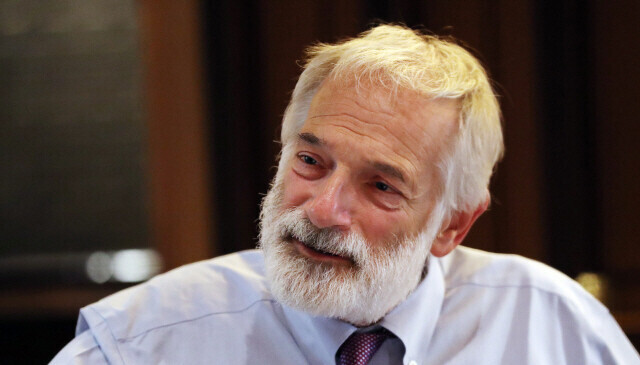hankyoreh
Links to other country sites 다른 나라 사이트 링크
War in NE Asia this year isn’t out of question, suggests former US nuke negotiator

Robert Gallucci, a former US State Department special representative on the North Korean nuclear issue and a key figure behind the 1994 Agreed Framework between North Korea and the US, shared a message calling on Washington to pursue the normalization of relations with Pyongyang with denuclearization as a long-term goal.
“We should at least entertain the thought that nuclear war could break out in Northeast Asia in 2024,” he warned.
Gallucci, a distinguished professor at Georgetown University, presented his message in a Jan. 11 contribution to the foreign affairs and national security magazine National Interest.
“Instead of provocations designed to draw attention and create bargaining chips, [North Korea] has settled [over the last three years] on steady, determined testing of long-range ballistic missiles to deter any attempt at regime change and acquiring fissile material for an expanded nuclear weapons arsenal to threaten ‘first use’ of nuclear weapons in the event of a conflict,” he wrote.
Siegfried Hecker, a nuclear scientist and longtime North Korea observer, similarly argued in a September 2023 piece in Foreign Policy that North Korean leader Kim Jong-un’s recent move toward Russia was “neither tactical nor desperate,” instead describing it as “the result of a fundamental shift in North Korean policy, finally abandoning a 30-year effort to normalize relations with the United States.”
With North Korea shifting the course of its US policy from the aim of normalizing relations — which it had maintained for three decades since the end of the Cold War — to a more aggressive strategy of willingness to preemptively use nuclear weapons, Hecker stressed the need for a more circumspect and realistic approach.
In his piece, Gallucci identified concrete scenarios where nuclear war might occur in East Asia. The first of them was one in which North Korea poses a nuclear threat to US military assets and allies in Northeast Asia while the US and China are facing off over the Taiwan issue.
He also described a second scenario in which “the North Korean leadership decides to use its nuclear weapons arsenal and delivery vehicles to compel South Korean compliance with the North’s political and territorial directives.” In other words, he broached the prospect of North Korea attempting to achieve political and territorial aims by threatening the South with nuclear weapons.
Going a step further, Gallucci suggested that “what the United States would actually do is not the critical calculation” in this scenario.
“The North may think that its developing ICBM capability will serve to [. . .] undercut the credibility of US extended deterrence to its allies in Asia,” he wrote.
The prediction here is that with North Korea having established the capabilities to launch a nuclear strike against any part of the US, it might mistakenly conclude that the US would not intervene if it threatened the South with nuclear weapons.
“They are, after all, relatively new to this ‘game’ as compared to the other states with nuclear weapons,” he observed. “And North Korean rhetoric on its willingness to use its nuclear weapons should not give us confidence that this would be such a low-probability event.”
In conclusion, he argued that the US “must genuinely seek normalization of relations [with North Korea] and keep denuclearization as a longer-term goal rather than a first step in the process.”
During the first nuclear crisis in 1994, Gallucci played a leading role in negotiations with Pyongyang as a special envoy appointed by the Bill Clinton administration. The result was the Agreed Framework reached in Geneva in October 1994, which had North Korea abandoning its nuclear development in exchange for the construction of light water reactors in its territory.
The framework was effectively abandoned after the US alleged in October 2002 that North Korea was engaged in nuclear development using highly enriched uranium.
By Cho Ki-weon, staff reporter
Please direct questions or comments to [english@hani.co.kr]

Editorial・opinion
![[Correspondent’s column] The real reason the US is worried about Chinese ‘overcapacity’ [Correspondent’s column] The real reason the US is worried about Chinese ‘overcapacity’](https://flexible.img.hani.co.kr/flexible/normal/500/300/imgdb/original/2024/0510/5217153290112576.jpg) [Correspondent’s column] The real reason the US is worried about Chinese ‘overcapacity’
[Correspondent’s column] The real reason the US is worried about Chinese ‘overcapacity’![[Editorial] Yoon’s gesture at communication only highlights his reluctance to change [Editorial] Yoon’s gesture at communication only highlights his reluctance to change](https://flexible.img.hani.co.kr/flexible/normal/500/300/imgdb/original/2024/0510/7717153284590168.jpg) [Editorial] Yoon’s gesture at communication only highlights his reluctance to change
[Editorial] Yoon’s gesture at communication only highlights his reluctance to change- [Editorial] Perilous stakes of Trump’s rhetoric around US troop pullout from Korea
- [Guest essay] Preventing Korean Peninsula from becoming front line of new cold war
- [Column] The state is back — but is it in business?
- [Column] Life on our Trisolaris
- [Editorial] Penalties for airing allegations against Korea’s first lady endanger free press
- [Editorial] Yoon must halt procurement of SM-3 interceptor missiles
- [Guest essay] Maybe Korea’s rapid population decline is an opportunity, not a crisis
- [Column] Can Yoon steer diplomacy with Russia, China back on track?
Most viewed articles
- 1[Correspondent’s column] The real reason the US is worried about Chinese ‘overcapacity’
- 2S. Korea “monitoring developments” after report of secret Chinese police station in Seoul
- 3Nuclear South Korea? The hidden implication of hints at US troop withdrawal
- 4[Editorial] Yoon’s gesture at communication only highlights his reluctance to change
- 5Yoon voices ‘trust’ in Japanese counterpart, says alliance with US won’t change
- 6No good, very bad game for Korea puts it out of Olympics for first time since 1988
- 7Presidential office warns of veto in response to opposition passing special counsel probe act
- 8Smartphones have been shown to hurt brain development — can Korean kids kick the habit?
- 9‘We must say no’: Seoul defense chief on Korean, USFK involvement in hypothetical Taiwan crisis
- 10Korea poised to overtake Taiwan as world’s No. 2 chip producer by 2032